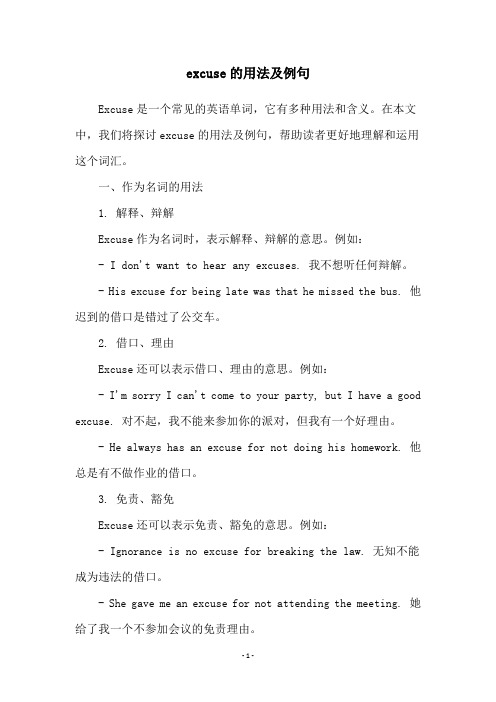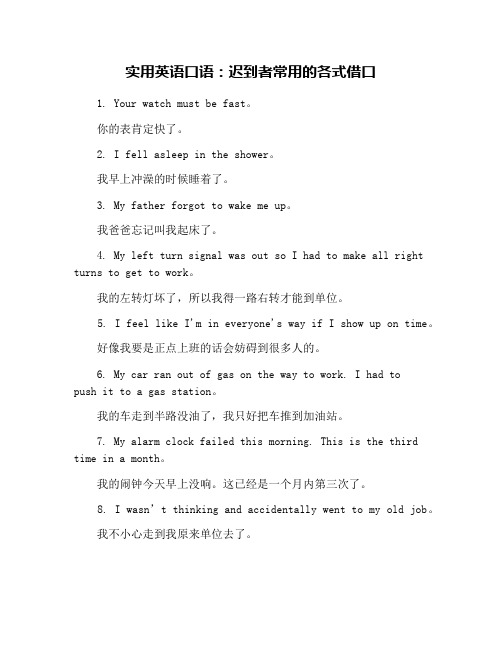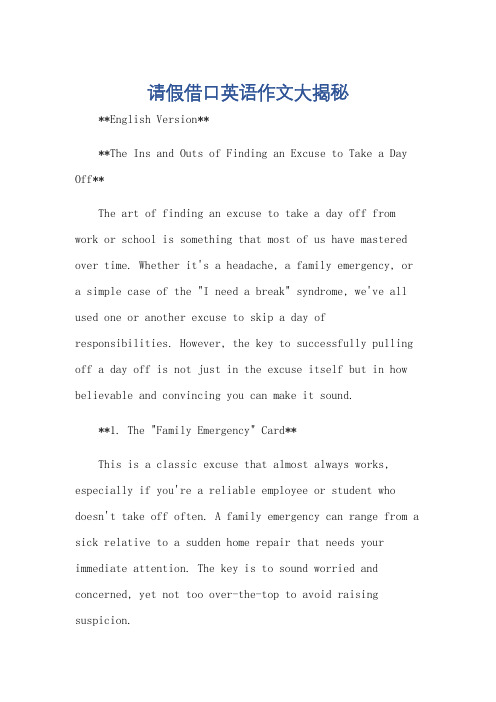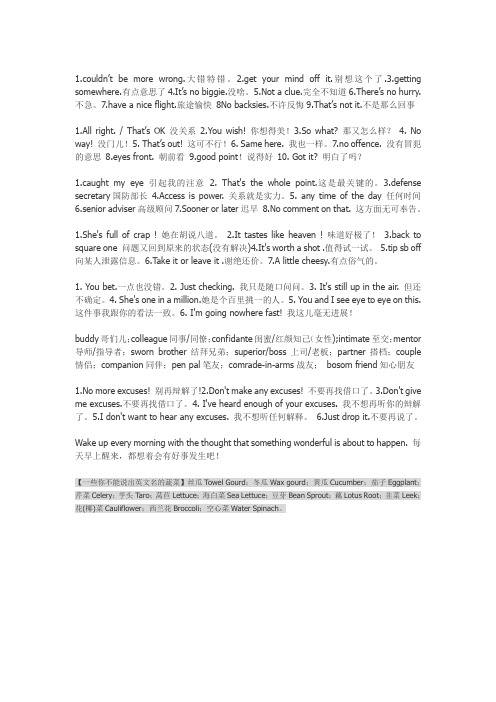英语中各种借口的表达
excuse的用法及例句

excuse的用法及例句Excuse是一个常见的英语单词,它有多种用法和含义。
在本文中,我们将探讨excuse的用法及例句,帮助读者更好地理解和运用这个词汇。
一、作为名词的用法1. 解释、辩解Excuse作为名词时,表示解释、辩解的意思。
例如:- I don't want to hear any excuses. 我不想听任何辩解。
- His excuse for being late was that he missed the bus. 他迟到的借口是错过了公交车。
2. 借口、理由Excuse还可以表示借口、理由的意思。
例如:- I'm sorry I can't come to your party, but I have a good excuse. 对不起,我不能来参加你的派对,但我有一个好理由。
- He always has an excuse for not doing his homework. 他总是有不做作业的借口。
3. 免责、豁免Excuse还可以表示免责、豁免的意思。
例如:- Ignorance is no excuse for breaking the law. 无知不能成为违法的借口。
- She gave me an excuse for not attending the meeting. 她给了我一个不参加会议的免责理由。
二、作为动词的用法1. 请求允许、打扰Excuse作为动词时,表示请求允许、打扰的意思。
例如:- Excuse me, can I ask you a question? 对不起,我可以问你一个问题吗?- Excuse me, could you please move your bag? 对不起,你能把你的包移开吗?2. 原谅、宽恕Excuse还可以表示原谅、宽恕的意思。
例如:- I hope you can excuse my mistake. 我希望你能原谅我的错误。
实用英语口语:迟到者常用的各式借口

实用英语口语:迟到者常用的各式借口
1. Your watch must be fast。
你的表肯定快了。
2. I fell asleep in the shower。
我早上冲澡的时候睡着了。
3. My father forgot to wake me up。
我爸爸忘记叫我起床了。
4. My left turn signal was out so I had to make all right turns to get to work。
我的左转灯坏了,所以我得一路右转才能到单位。
5. I feel like I'm in everyone's way if I show up on time。
好像我要是正点上班的话会妨碍到很多人的。
6. My car ran out of gas on the way to work. I had to
push it to a gas station。
我的车走到半路没油了,我只好把车推到加油站。
7. My alarm clock failed this morning. This is the third time in a month。
我的闹钟今天早上没响。
这已经是一个月内第三次了。
8. I wasn’t thinking and accidentally went to my old job。
我不小心走到我原来单位去了。
Module 8 Unit 1 外研版英语九年级上册知识点详解

外研版九(上)Module 8 Sports life知识点详解Unit 1 Daming wasn’t chosen for the team last time.★(A3).【知识点再现】Hi, Tony, you look tired. 你好, 托尼! 你看起来很累。
【知识点1】look tired意为“看起来累”。
look用着系动词,意为“看起来”,其后常接形容词作表语。
类似系动词还有:taste/sound/smell/feel/seem/become/get / turn...+adj.(形容词)。
如:She looked a little tired. 她看起来有点疲倦。
You look beautiful in this green dress. 你穿这条绿裙子看起来很漂亮。
★(A3).【知识点再现】Who are you playing against? 你们和哪个队比赛?【知识点2】play against...意为“与……比赛/对抗”。
against是介词,意为“与……相反/相对;反对;违背”,通常与be连用,短语be against意为“反对”。
其反义词为be for意为“赞成”。
如:Our team played against Class Three. 我们队与三班进行了比赛。
The soldiers fought against the enemies fiercely. 战士们与敌人激烈战斗。
Are you against or for this plan? 你是反对还是赞成这个计划?★(A3).【知识点再现】What does HAS stand for? HAS代表什么?【知识点3】【辨析】stand for与represent的用法辨析:①stand for意为“代表,象征,是……的缩写,意味着”,多指抽象物体,是指用字母、数字或符号来表示一个单词,名字或是某个概念的缩写形式,其同义词为be short for或represent。
请假借口英语作文

请假借口英语作文大揭秘**English Version****The Ins and Outs of Finding an Excuse to Take a Day Off**The art of finding an excuse to take a day off from work or school is something that most of us have mastered over time. Whether it's a headache, a family emergency, or a simple case of the "I need a break" syndrome, we've all used one or another excuse to skip a day of responsibilities. However, the key to successfully pulling off a day off is not just in the excuse itself but in how believable and convincing you can make it sound.**1. The "Family Emergency" Card**This is a classic excuse that almost always works, especially if you're a reliable employee or student who doesn't take off often. A family emergency can range from a sick relative to a sudden home repair that needs your immediate attention. The key is to sound worried and concerned, yet not too over-the-top to avoid raising suspicion.**2. The "Medical Reason" Excuse**Health issues are always a great way to get out of something, and they're especially effective when you truly are feeling under the weather. From a mild fever to a severe migraine, medical reasons can give you a legitimate reason to stay home. Just make sure to follow up with a genuine-sounding explanation and, if possible, a doctor's note.**3. The "Personal Matters" Excuse**This excuse is more vague and open-ended, allowing you to fill in the blanks as needed. Personal matters can cover anything from dealing with a personal crisis to attending to important personal business. The key is to sound serious and responsible, yet not too specific to avoid any follow-up questions.**4. The "Unexpected Workload" Excuse**For those who work in high-pressure environments, claiming an unexpected workload can be a great way to buy some extra time. Whether it's a last-minute project or a sudden influx of work, this excuse can give you alegitimate reason to stay late or work from home. Just make sure to sound stressed and overwhelmed, yet not too over-the-top to avoid sounding fake.**5. The "Simple Mistake" Excuse**Sometimes, the simplest excuses are the most effective. Claiming that you made a simple mistake, like forgetting an important meeting or mixing up dates, can give you an easy way out of a sticky situation. The key is to sound embarrassed and apologetic, yet not too embarrassed toadmit your mistake.In conclusion, the art of finding an excuse to take a day off lies in finding the perfect balance between believability and creativity. Whether you choose to playthe part of a worried family member, a sick employee, or a forgetful student, remember to always keep your excuse consistent and believable to avoid any suspicion.**Chinese Version****请假借口英语作文揭秘**请假,无论是在工作还是学习中,都是许多人曾经或正在尝试的技巧。
excuse用法

excuse用法Excuse是一个常用的英语单词,意为“借口、辩解、原谅”。
在日常生活中,我们经常会用到这个词,比如在道歉、拒绝、推卸责任等情境中。
在本文中,我们将从不同角度探讨excuse的用法及其相关表达。
一、道歉用excuse在英语中,道歉时常用excuse来表达自己的歉意和解释原因。
例如:1. I'm sorry I'm late. I got stuck in traffic.(对不起我迟到了,我被堵在了交通中)2. I'm sorry for what I said earlier. I was out of line.(对我之前说的话我感到抱歉,我说话太过分了)3. Please excuse my behavior last night. I had too much to drink.(请原谅我昨晚的行为,我喝醉了)在这些例句中,excuse的意思是“原谅、谅解”。
通过使用excuse,我们可以向对方表达自己的歉意,并说明自己的原因,以期得到对方的谅解。
二、拒绝用excuse除了道歉外,excuse还可以用于拒绝他人的请求或邀请。
例如: 1. I'm sorry, I can't come to your party tonight. I have to work late.(对不起,我不能参加你今晚的聚会,我要加班)2. I'm sorry, I can't lend you any money right now. I'm alittle short myself.(对不起,我现在没法借你钱,我自己也有点短缺)3. I'm sorry, I can't help you move this weekend. I have other plans.(对不起,我这个周末不能帮你搬家,我有其他安排)在这些例句中,excuse的意思是“拒绝、推卸责任”。
英语中常见的口语

1.couldn’t be more wrong.大错特错。
2.get your mind off it.别想这个了.3.getting somewhere.有点意思了4.It’s no biggie.没啥。
5.Not a clue.完全不知道6.There’s no hurry.不急。
7.have a nice flight.旅途愉快8No backsies.不许反悔9.That’s not it.不是那么回事1.All right. / That’s OK 没关系2.You wish! 你想得美!3.So what? 那又怎么样?4. No way! 没门儿!5. That’s out! 这可不行!6. Same here. 我也一样。
7.no offence. 没有冒犯的意思8.eyes front. 朝前看9.good point!说得好10. Got it? 明白了吗?1.caught my eye 引起我的注意2. That's the whole point.这是最关键的。
3.defense secretary国防部长4.Access is power. 关系就是实力。
5. any time of the day 任何时间6.senior adviser高级顾问7.Sooner or later迟早8.No comment on that. 这方面无可奉告。
1.She's full of crap ! 她在胡说八道。
2.It tastes like heaven ! 味道好极了!3.back to square one 问题又回到原来的状态(没有解决)4.It's worth a shot .值得试一试。
5.tip sb off 向某人泄露信息。
6.Take it or leave it .谢绝还价。
7.A little cheesy.有点俗气的。
1. You bet.一点也没错。
撒谎的英语所有形式
撒谎的英语所有形式撒谎是人类日常交流中一种常见的行为。
然而,在不同的语言和文化中,撒谎的形式和表达方式可能会有所不同。
本文将探讨撒谎在英语中的各种形式和相关的文化背景。
1. White lie(善意谎言)善意谎言是在保护他人感受或维护社交和睦关系的情况下所说的谎言。
在英语中,人们常常使用一些表达方式来掩饰真相,以避免伤害或尴尬。
实例:•“I’m sorry, but I already have plans that night.”(对不起,但是那天晚上我已经有安排了。
)•“This dish you made tastes absolutely delicious!”(你做的这道菜真的非常好吃!)这种形式的谎言通常是片面的或夸大其词的表达,用于让对方感到受欢迎或受到赞扬。
2. Exaggeration(夸大其词)夸大其词是一种常见的撒谎形式,用于突出某个事物或情况的重要性或程度。
英语中也有一些常见的表达方式,用于增强表达的效果。
实例:•“I’ve told you a million times not to do that!”(我已经告诉你一百万次不要那样做了!)•“I could eat a horse right now!”(我现在能吃下一匹马!)这种形式的撒谎通常是为了夸张效果或引起注意,并非真的有意欺骗他人。
3. Evasion(回避)有时候,人们会使用回避来回答一些问题或者避免谈论某些话题。
这种形式的撒谎有时可以通过模糊或避免直接回答问题来实现。
实例:•“I’m not quite sure yet, let me think about it.”(我还不确定,让我考虑一下。
)•“I’d rather not discuss that right now.”(我现在不想讨论这个话题。
)回避谎言通常是为了避开尴尬的话题或者让对方感到你并不愿意透露太多信息。
4. False flattery(虚伪恭维)虚伪恭维是一种表面上对他人称赞,但实际上并不真心的行为。
考研《英语》作文常用万能理由(积极、消极)
考研英语作文万能理由这个是我在复习GRE的过程中,搜集到好的万能的句子,只把适合考研的一些句子抄了出来,对于一些词汇量较大的句子进行了改写,希望能对大家的万能理由的积累有一些帮助。
积极理由1、*** offers extensive opportunities for every country in the world.2、The majority of students believe that *** will provide them with more opportunities to develop their interpersonal skills ,which may put them in a favorable position in the future job markets.大部分学生相信***会使他们有更多机会发展人际交往能力,而这对他们未来找工作是非常有好处的.【这句话也是五的,***可以是part-time job、络,文化交流等等,思路要开阔】3、Judging from the social comprehensive factors, we can safely conclude that the Internet will change the lives of an untold number of people forever .根据社会等综合因素,我们可以有把握地得出这样的结论:络将永远改变无数人的生活。
【科学统计法的有一个例子,把Internet换成文化,自信,合作也很OK了,而且用了safely conclude语气非常得体,推荐】4、By taking a major-related ***, students can not only improve their academic studies, but gain much experience, experience they will never be able to get from the textbooks.学生不仅可以提高学习成绩,还可以获得在课本上学不到的经验。
英语中各种借口的表达
英语中各种借口的表达"我迟到了"这么说>I'm sorry I'm late. 真抱歉我迟到了。
Sorry to have kept you waiting. 很抱歉让大家等我一个人。
如果是自己开车,理由非常多:I ran out of gas. 我要去加油。
I got lost. 我迷路了。
I don't have GPS. 我没有全球定位系统。
I missed my exit. 我错过了高速(高架)出口。
There was construction. 碰上修路了。
There was an accident. 遇上车祸了。
It was farther than I thought. 这地方比我想得远多了。
I couldn't find a parking spot. 我找不到停车位。
如果不是自己开车,大众交通工具更容易摊上事:I couldn't get a taxi. 我打不到车。
The bus was late. 公交车晚了。
I missed the bus. 我没挤上公交车。
I was stuck in traffic. 遇上堵车了。
交通状况我控制不了,生病我也控制不了啊:I feel sick. 我病了。
I don't feel well. 我不舒服。
I'm a little under the weather. 我身体有点不适。
My skin is breaking out. 我皮肤过敏了。
I'm dizzy. 我头晕。
I'm so dizzy I can't stand up. 我晕得站也站不起来。
I have a headache.=My head hurts. 我头痛。
I feel sick to my stomach. 我胃痛。
这还不算,我有时是活雷锋,我要帮助别人啊。
我是有朋友的人好吗,我要帮朋友好吗:I had to drop someone off. 我要送个朋友。
英语中还有很多委婉语学起来说话可别太直了
英语中还有很多委婉语学起来说话可别太直了!英语中还有很多委婉语,学起来~说话可别太直了!含蓄的东方人总觉得西方人都粗线条,实际上歪果仁也是比较容易玻璃心的……所以,说英语的时候可别太直爽,碰到敏感的(sensitive)、私人的(personal)、禁忌的(taboo)话题,还是要讲究点技巧的。
飞儿跟大家说说英语里的常见委婉语(euphemism)。
一、厕所身体机能是文雅人士需避免的话题1. restroomCan I use the restroom?我可以用下洗手间吗?Where can I wash my hands?哪儿有洗手间?2. public conveniencesAre there any public conveniences nearby?附近可有公共卫生间?3. ladies / gentsThe ladies and gents are down the corridor on your right.女士和男士卫生间就在你右手边的走廊里。
还有一些幽默表达:4. the smallest room of the house 房子里最小的一间屋,这种诙谐说法于20世纪30年代出现在英文里,现在已经有些过时,较少被使用。
I'd like to pay a visit to the smallest room of the house.我要去“参观”一下厕所。
5. powder my nose女士用补妆来委婉表达上厕所,当然爱开玩笑的男士也可以这么说。
Where can I powder my nose?我上哪儿能补个粉?6. see a man about a dog 这种说法原始意思是指为赛马或者赛狗下注,后来通常作为离开或缺席的借口。
原因通常是去上厕所,或者买酒。
He's gone to see a man about a dog.他去方便了。
二、失业1. between jobs 在前一个和后一个工作之间,也就是待业啦。
- 1、下载文档前请自行甄别文档内容的完整性,平台不提供额外的编辑、内容补充、找答案等附加服务。
- 2、"仅部分预览"的文档,不可在线预览部分如存在完整性等问题,可反馈申请退款(可完整预览的文档不适用该条件!)。
- 3、如文档侵犯您的权益,请联系客服反馈,我们会尽快为您处理(人工客服工作时间:9:00-18:30)。
英语中各种借口的表达
"我迟到了"这么说>
I'm sorry I'm late. 真抱歉我迟到了。
Sorry to have kept you waiting. 很抱歉让大家等我一个人。
如果是自己开车,理由非常多:
I ran out of gas. 我要去加油。
I got lost. 我迷路了。
I don't have GPS. 我没有全球定位系统。
I missed my exit. 我错过了高速(高架)出口。
There was construction. 碰上修路了。
There was an accident. 遇上车祸了。
It was farther than I thought. 这地方比我想得远多了。
I couldn't find a parking spot. 我找不到停车位。
如果不是自己开车,大众交通工具更容易摊上事:
I couldn't get a taxi. 我打不到车。
The bus was late. 公交车晚了。
I missed the bus. 我没挤上公交车。
I was stuck in traffic. 遇上堵车了。
交通状况我控制不了,生病我也控制不了啊:
I feel sick. 我病了。
I don't feel well. 我不舒服。
I'm a little under the weather. 我身体有点不适。
My skin is breaking out. 我皮肤过敏了。
I'm dizzy. 我头晕。
I'm so dizzy I can't stand up. 我晕得站也站不起来。
I have a headache.=My head hurts. 我头痛。
I feel sick to my stomach. 我胃痛。
这还不算,我有时是活雷锋,我要帮助别人啊。
我是有朋友的人好吗,我要帮朋友好吗:
I had to drop someone off. 我要送个朋友。
My last appointment ran over. 我上一个约会耽搁了。
实在不行,我承认我是个不靠谱的人好了吧,睡过头什么的也不是没发生过。
我就是这么不靠谱一人怎么着:
I overslept. 我睡过头了。
My alarm didn't go off. 我的闹钟没响。
I misjudged the time. 我看错时间了。
I lost track of time. 我忘了时间了。
I had to get money. 我去取钱了。
I had to run an errand. 我有事要办。
